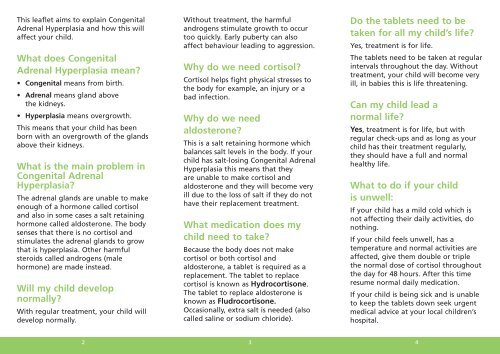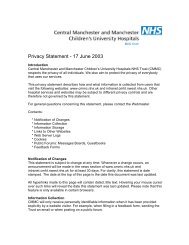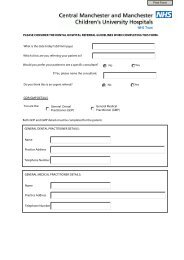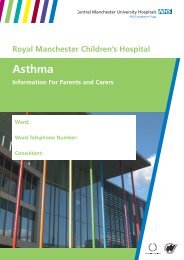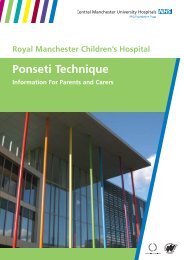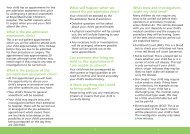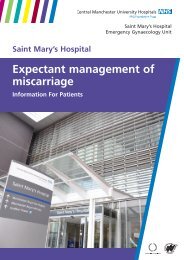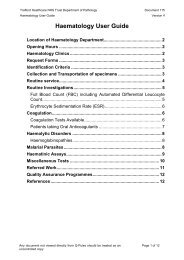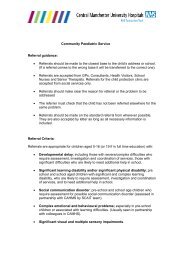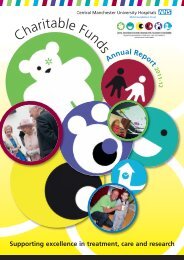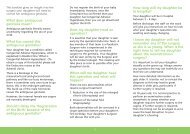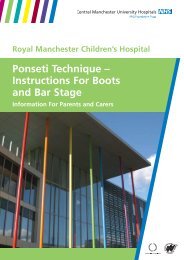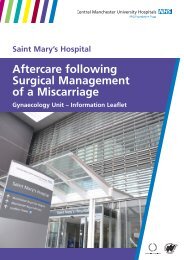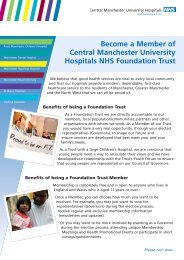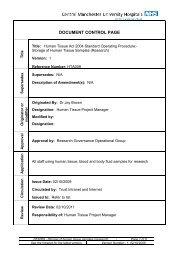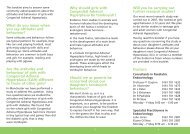Congenital Adrenal Hyperplasia - Central Manchester University ...
Congenital Adrenal Hyperplasia - Central Manchester University ...
Congenital Adrenal Hyperplasia - Central Manchester University ...
Create successful ePaper yourself
Turn your PDF publications into a flip-book with our unique Google optimized e-Paper software.
This leaflet aims to explain <strong>Congenital</strong><br />
<strong>Adrenal</strong> <strong>Hyperplasia</strong> and how this will<br />
affect your child.<br />
What does <strong>Congenital</strong><br />
<strong>Adrenal</strong> <strong>Hyperplasia</strong> mean?<br />
• <strong>Congenital</strong> means from birth.<br />
• <strong>Adrenal</strong> means gland above<br />
the kidneys.<br />
• <strong>Hyperplasia</strong> means overgrowth.<br />
This means that your child has been<br />
born with an overgrowth of the glands<br />
above their kidneys.<br />
What is the main problem in<br />
<strong>Congenital</strong> <strong>Adrenal</strong><br />
<strong>Hyperplasia</strong>?<br />
The adrenal glands are unable to make<br />
enough of a hormone called cortisol<br />
and also in some cases a salt retaining<br />
hormone called aldosterone. The body<br />
senses that there is no cortisol and<br />
stimulates the adrenal glands to grow<br />
that is hyperplasia. Other harmful<br />
steroids called androgens (male<br />
hormone) are made instead.<br />
Will my child develop<br />
normally?<br />
With regular treatment, your child will<br />
develop normally.<br />
Without treatment, the harmful<br />
androgens stimulate growth to occur<br />
too quickly. Early puberty can also<br />
affect behaviour leading to aggression.<br />
Why do we need cortisol?<br />
Cortisol helps fight physical stresses to<br />
the body for example, an injury or a<br />
bad infection.<br />
Why do we need<br />
aldosterone?<br />
This is a salt retaining hormone which<br />
balances salt levels in the body. If your<br />
child has salt-losing <strong>Congenital</strong> <strong>Adrenal</strong><br />
<strong>Hyperplasia</strong> this means that they<br />
are unable to make cortisol and<br />
aldosterone and they will become very<br />
ill due to the loss of salt if they do not<br />
have their replacement treatment.<br />
What medication does my<br />
child need to take?<br />
Because the body does not make<br />
cortisol or both cortisol and<br />
aldosterone, a tablet is required as a<br />
replacement. The tablet to replace<br />
cortisol is known as Hydrocortisone.<br />
The tablet to replace aldosterone is<br />
known as Fludrocortisone.<br />
Occasionally, extra salt is needed (also<br />
called saline or sodium chloride).<br />
Do the tablets need to be<br />
taken for all my child’s life?<br />
Yes, treatment is for life.<br />
The tablets need to be taken at regular<br />
intervals throughout the day. Without<br />
treatment, your child will become very<br />
ill, in babies this is life threatening.<br />
Can my child lead a<br />
normal life?<br />
Yes, treatment is for life, but with<br />
regular check-ups and as long as your<br />
child has their treatment regularly,<br />
they should have a full and normal<br />
healthy life.<br />
What to do if your child<br />
is unwell:<br />
If your child has a mild cold which is<br />
not affecting their daily activities, do<br />
nothing.<br />
If your child feels unwell, has a<br />
temperature and normal activities are<br />
affected, give them double or triple<br />
the normal dose of cortisol throughout<br />
the day for 48 hours. After this time<br />
resume normal daily medication.<br />
If your child is being sick and is unable<br />
to keep the tablets down seek urgent<br />
medical advice at your local children’s<br />
hospital.<br />
2 3<br />
4
If you have been taught and feel<br />
confident give an emergency injection<br />
of hydrocortisone to your child, and<br />
then ring 999.<br />
Contacts<br />
Doctors:<br />
Consultants in Paediatric<br />
Endocrinology<br />
Professor P Clayton 0161 701 1632<br />
Dr I Banerjee 0161 701 1675<br />
Dr L Patel 0161 701 1632<br />
Dr S Ehtisham 0161 701 1683<br />
Dr R Padidela 0161 701 1628<br />
Dr M Skae 0161 701 1630<br />
Monday – Friday 9.00 am – 5.00 pm<br />
No Smoking Policy<br />
The NHS has a responsibility for the<br />
nation’s health.<br />
Protect yourself, patients, visitors and<br />
staff by adhering to our no smoking<br />
policy. Smoking is not permitted within<br />
any of our hospital buildings or grounds.<br />
The <strong>Manchester</strong> Stop Smoking Service<br />
can be contacted on Tel: (0161) 205 5998<br />
(www.stopsmokingmanchester.co.uk).<br />
Translation and Interpretation Service<br />
Do you have difficulty speaking or understanding English?<br />
Royal <strong>Manchester</strong><br />
Children’s Hospital<br />
What is <strong>Congenital</strong><br />
<strong>Adrenal</strong><br />
<strong>Hyperplasia</strong>?<br />
Information for Parents<br />
and carers<br />
Surgeon:<br />
Consultant Paediatric Surgeon<br />
Mr Antonio Morabito 0161 701 2194<br />
Monday – Friday 9.00 am – 5.00 pm<br />
Specialist Practitioners in<br />
Endocrinology<br />
Julie Jones 0161 701 2587<br />
Elaine O’Shea 0161 701 2587<br />
Monday – Friday 8.30 am – 4.30 pm<br />
Further information<br />
www.cah.org.uk<br />
5<br />
☎ 0161 276 6202/6342<br />
Endocrinology Department<br />
Royal <strong>Manchester</strong><br />
Children’s Hospital<br />
Oxford Road<br />
<strong>Manchester</strong><br />
M13 9WL<br />
www.cmft.nhs.uk<br />
© Copyright to <strong>Central</strong> <strong>Manchester</strong> <strong>University</strong> Hospitals<br />
NHS Foundation Trust<br />
TIG 76/11 Produced August 2011 Review August 2013<br />
(SF Taylor CM12081)


